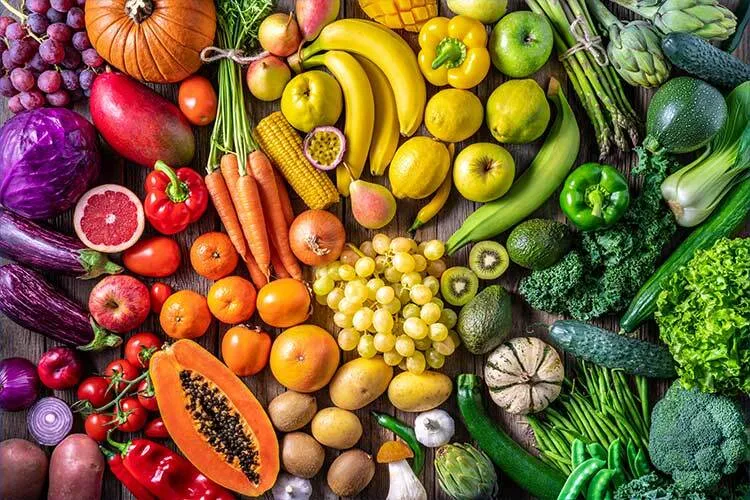Eating fruits and vegetables is an essential part of a balanced diet. These foods are rich in vitamins, nutrients, and fiber and they are necessary to have good health. However, in Mexico, 83.8% of children from 1 to 4 years old do not have adequate consumption of them.
In a study carried out for her master’s in Biosciences, Fernanda Bujaidar, a nutritionist at the Tec de Monterrey School of Medicine and Health Sciences, analyzed representative data for the entire population, collected in the National Health and Nutrition Survey (Ensanut) of 2018.
“The results we obtained are alarming because it is from that age that people’s eating patterns are established,” says Bujaidar in an interview with TecScience.
Their study is part of a line of research carried out by the group led by Julieta Rodríguez de Ita, pediatrician and researcher at Hospital San José de TecSalud, and Fabiola Castorena, research professor at the School of Medicine and Health Sciences at Tec de Monterrey, that seeks to understand how our children are experiencing early childhood in Mexico.
The concern about their consumption of fruits and vegetables started 5 years ago when they analyzed past surveys and realized that preschool children are not represented in the data that is communicated to the general population.
In addition, there are no official guides from health authorities that establish how much of these foods children of these ages should consume to have adequate nutrition.
“This is a group that is hidden, that’s not seen,” says Rodríguez de Ita in an interview with TecScience.
Mexican children don’t eat fruit and vegetables
According to Bujaidar and Rodríguez de Ita, the situation is more serious than they expected, since the most common components of the diet of children between 1 and 4 years of age are sweetened drinks, snacks, sweets, desserts, sugary cereals, dairy products, and water.
Meanwhile, the consumption of meat or protein, eggs, fruits, and vegetables is extremely low. This could be even worse because Ensanut considers that a child consumes fruits and vegetables in an adequate proportion if they eat a minimum of 30 grams of these foods a week.
“This is equivalent to a child of this age eating half an apple a week,” Bujaidar explains. For her, if we were more strict in the measurements, the high percentage of preschool children who do not consume them would be even higher.
Fruits and vegetables are rich in fiber, which directly improves gastrointestinal health, satiety, and helps reduce certain diseases such as diabetes, cancer, or microbiota disorders.
“Children who consume fruits and vegetables will be more satisfied during the day, their insulin peaks will be more stable, they will have energy throughout the day and their development will be optimal,” explains Rodríguez de Ita.
In addition, their study found that children who do not eat them are more likely to be classified as overweight and obese. This echoes the fact that Mexico is the country with the highest childhood obesity in the world.
For Rodríguez de Ita, it is important to emphasize that this food group cannot be replaced by any other, nor by vitamins or supplements, it is necessary to consume them whole.
A multifactorial problem
When performing statistical analyzes of the Ensanut data, they found that 8 out of 10 children do not consume enough fruits and vegetables, but they also found correlations that indicate a multifactorial problem.
There is a relationship between the life situation of these children and their diet. Children who live in rural areas, or who belong to the lower class, consume less fruits and vegetables than those who live in urban areas, or who belong to the upper class. Also, those who live in the center of the country consume more fruits and vegetables than those who live in the south, for example.
The family situation also has an influence, because if parents don’t consume vegetables and fruits at home and don’t habituate their children to eat them from an early age, it is likely that they will reject them.
How to solve it?
According to Rodríguez de Ita, the first step to begin to solve the problem is to make it visible, since there are no programs that teach preschool children and their parents the importance of consuming enough vegetables and fruits.
“There is a huge challenge in education and public health,” says Rodríguez de Ita.
In public policy, it is necessary to continue promoting regulations that reduce the prevalence of processed foods, high in fats and refined sugars. The obesogenic environment in which we live further complicates the situation.
It is also necessary that at the national level, clear guidelines be established for the amounts that should be consumed of these foods per day and prioritize the availability of fresh and nutritious foods.
At home, the researcher suggests different options to encourage adequate nutrition in small children.
The first is to take children to choose fruits and vegetables and let them wash them, there is scientific evidence that exposure to these foods increases consumption in children.
Also, if the child rejects them, a new habit can be formed by giving them at least one small serving of a single fruit or vegetable a day for 10 weeks, and gradually introducing a wider variety.
Lastly, the most supported technique by experimental evidence is rewarding, that is, congratulating children verbally; giving them a star or a small gift when they eat fruits and vegetables.
Since public policies usually do not advance so quickly, Rodríguez de Ita invites the population to reflect on the problem and begin to solve it from home. “Let’s think about our children when they are older, giving them fruits and vegetables is like buying them health insurance since they are babies”, she concludes.


















